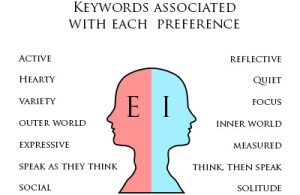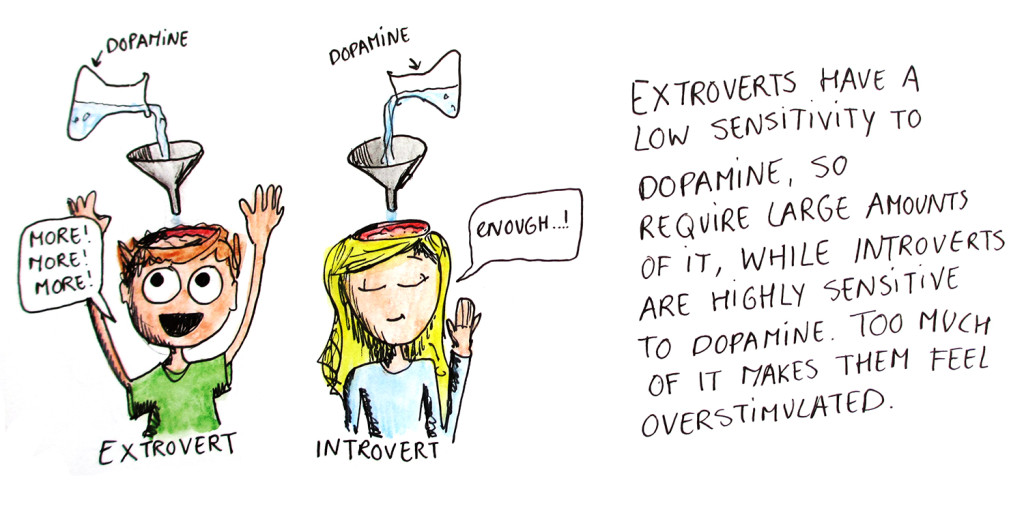 1st CASE: The Power Of Quiet
1st CASE: The Power Of Quiet
- (Question 5-19.) Are you more of an introverted or extroverted leader? What can you do to
leverage your personality to be a more effective leader? - Question 5-20. Would you prefer to be more introverted, or more extroverted, than you are? Why?
- Question 5-21. Do you agree with Cain’s arguments? Why or why not?
 Before answering these questions lets take a look at the general consensus on how introverts and extroverts act and think.
Before answering these questions lets take a look at the general consensus on how introverts and extroverts act and think.
A) Extroverts are active, hearty, variety, interested in the outer world, expressive, speaks as they think, social
B) Introverts are reflective, quiet, focus, inner world, measured, think then speak, solitude.
- Some people are both introverted and extroverted, depending on the situation they are in. It is necessary to a person to change their personality in order become a more effective leader.” There has been some debate throughout the years about the validity some of some of the research that’s out. Some reaches are conducted in environments and with individuals unknown to the general public or mainstream media. Research from sources that are not clearly explained outside the lab. Then they go mainstream, people hear about the theory or study but not so much about the author. Some say that he rhetoric behind a searcher is not perfectly known, neither about the exact what processes used in the research, yet we take it at face value. One example of taking things at face value was the research conducted decades ago that said tobacco was good for your health. Then, we (the business world), believe it without questioning it, and we follow the fad [Fad or trend is any form of behavior that develops among a large population and is collectively followed enthusiastically for a period of time, generally as a result of the behavior being perceived as popular by one’s peers or being deemed “cool” by social or other media].
- The Book on Organizational Behavior by Robbins says, “… because extroverts like to be in charge and shape environments to fit their wishes.” Readers don’t know what the researcher is employing here, and we are not sure what questions were asked that shaped this conclusion; but a character who likes to be in control and manipulate the environment to his or her “self-advantage,” is someone I would not consider hiring material. I subscribe to the idea of hiring or working with an introvert–or anyone for that matte–who seeks and promotes leadership in others, not within him or herself. A person who can transform environments with creative and innovative ideas (Marc Zuckerberg, Facebook, is an introvert) is a great leader.Susan Cain author of the book “Quiet: The Power of Introverts in a World That Can’t Stop Talking,”, says, “don’t mistake assertiveness and eloquence for good ideas.” Right now, the world is full of extroverted people who have vaporized introverted-talented people. In this sense, we have failed to capitalize on the many virtues of introverts. To continue enforcing the perception that an extroverted personality is better is a fad. Extroverts need to see, to learn, to understand and respect introverts and diversity in general. Expecting everyone to think and to act alike 24/7 is a very narrow worldview.
- We are missing the big picture here. With the belief that extroverts are better, we are losing a huge segmented group of the population whose assets go to waste. We say that extroverts are better because we are extroverts because we listen to, we promote it, and we believe it– and not because it is real. We have fallen victims to a norm that we have created, and we are now missing a huge opportunity to have very talented people in the workplace, in the United States in particular. Now, the workforce is filled up with people who talk a good game but don’t deliver as much. We outsource talent to other countries, while other countries are doing a better job in their markets, like Asia whose “collective workforce” mentality is not the same as the west. We want people in teams, but we promote self-achievement–those two don’t go together (my humble opinion). And on top of that, we block and reject talented individuals because they don’t talk enough or look, and act like us.My personal take on this topic is that there are many other traits aside from personality that makes a person an effective “leader.” I think learning more about the environment we work in, the people in it, the culture, and the norms with an open mind are part of the skills one should have to be a more effective leader.Here is an except from Susan Cain about introverts
- TEAMS: The huge emphasis on team collaboration in the workplace has reached a level of absurdity nowadays, says Couto.
- Diane Coutu, former Harvard Business Review editor explains, “Why Teams Don’t Work.” She calls the fad about teams a “cult.” Couto explains that it is a false belief that we are at our best creative and productive stage when we are put into teams. The fad is so widespread that leaders are quick to assume that the best approach to get a task or a job done is through teams (Coutu, 2009).
- J. Richard Hackman, the Edgar Pierce Professor of Social and Organizational Psychology at Harvard University and a leading expert on teams who has spent a career exploring—and questioning—the wisdom of teams says in the following excerpt.
An excerpt from Dr. Hackman’s book, Leading Teams:
| “Research consistently shows that teams underperform, despite all the extra resources they have. That’s because problems with coordination and motivation typically chip away at the benefits of collaboration. And even when you have a strong and cohesive team, it’s often in competition with other teams, and that dynamic can also get in the way of real progress. So you have two strikes against you right from the start, which is one reason why having a team is often worse than having no team at all.” |
- Most of Dr. Hackman’s research shows that team members don’t even agree on what the team is supposed to be doing. Granted, getting into a team agreement is mostly the job of the team’s leader, but the leader must be willing to take great personal and professional risks to set the team’s direction, but many times the leader is not present (or non-existent) like in the case of Self-Managed work teams (Robbins, p.310), but often times the leader is not disciplined or versed on how to select team members and how the team will be best set up, so the chances the team will succeed are small.This brings us back to the same question.Are introverted people always quiet, not keen to change? Is it true that introverts don’t make good leaders? No, that is a fad as well. Some of the most introverted leaders in history are Abraham Lincoln, Rosa Parks, Heidi Brown, Albert Einstein and in recent years, Mark Zuckerberg whose astonishing success with Facebook is a testament to the power of an introvert. Some introverts have no problem with change and like talking and interacting with people when I’m put on a team. I have met and observed many introverted people over the years in my professional career. I have noticed that some introverted people tend to be pleasant and move along with changes; they also have come up with great ideas (if listened to). Introverts are not timid or insecure, they’re just not used to talking so much and, oh boy, does the world talk too much now a days, just look at the media. Introverts do not want to overshadow anyone, so they are great to work with and form parts of an effective, and collective team. They are more focused on the work at hand than worrying about self-image and promotion. Mostly, introverted people have a positive self-image (the reason why they don’t have the reason or need to be animated at all times in order to be noticed).
Erika Napoletano, a columnist at American Express OPEN, lists some of the reasons why introverts make excellent employees (Napoletano, 2014)
- They are good listeners: It explains that, while extroverts might be hopping from conversation to conversation, introverts are more interested in “digging into single concepts and details.” Because they listen to extroverts, all day long, introverts are adept at summing up thoughts and feelings into concise summaries.
- Introverts make powerful project team members: Napoletano explains that introverts are good consultants, psychological professionals, and strategists, in that they are keen on absorbing information, they are able to design well-planned courses of action.
Furthermore, while the extroverts are expending endless hours chatting, or gathering around the coffee area, introverts are focused on work most of the time, not chatting with co-workers for the sake of chatting. This doesn’t mean introverts don’t chat; on the contrary, their chatting habits are more work related (so they only speak when needed). While an extrovert is talking at work about her engagement ring or his new plasma TV, the introverts are focused on the actual job at hand. Personal conversations are left for after work hours.
CONCLUSION
Introverts or extroverts or people with both personalities are all fair game in the workplace, so long as the main objective remains the same: to work well alone and with each other and to learn from each others’ differences with an open mind, and to focus on the long-term goals of the organization, as well the short ones. Everyone in an organization is valuable and everyone should strive to obtain and maintain a healthy, productive and positive work environment–finding common ground of what makes us the same (example: the fact we all work in this field for this company, we’re all in this project, we all drink coffee, we all have kids, we all need this job, etc.), and leverage those similarities to find a common ground to improve communication and collaboration. If we are going to be negative and work hard on finding everything that is different and wrong with our co-workers, then for sure we will find it. Organizations should work hard on cultivating a positive culture that attempts to stay away from that type of negative norms or/and mentality (groupthink). Susan Cain recommends that we should “make the most of introverts’ strengths; these are people who can help us think deeply, strategize, solve complex problems and spot canaries in your coal mine. Don’t mistake assertiveness and eloquence for good ideas.” (Cain, 2013).
Excerpt from the book: QUIET: The Power of Introverts in a World That Can’t Stop, Talking
Ebook Link http://tinyurl.com/p652hsu
Fact: Extroverts have low sensitivity to dopamine, so required large amounts of it. While introverts are highly sensitive to dopamine. Too much of it makes them feel overstimulated.
Sources:
Cain, Susan. Quiet: The Power of Introverts in a World That Can’t Stop Talking. Online http://tinyurl.com/p652hsu. Broadway Books, 2013


